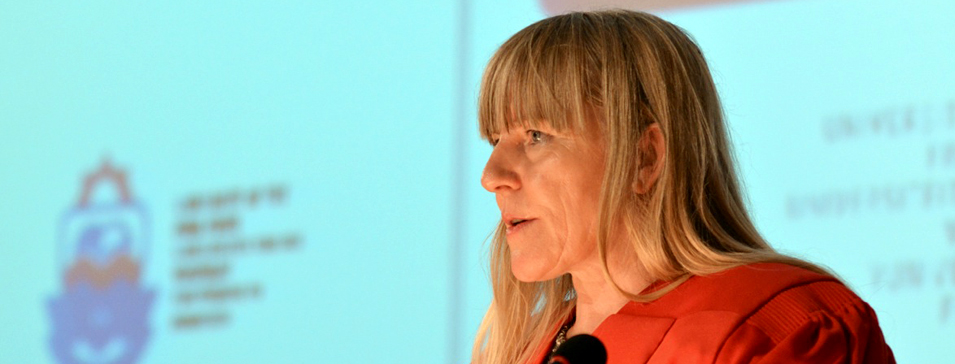Latest News Archive
Please select Category, Year, and then Month to display items
10 March 2022
|
Story Anthony Mthembu
|
Photo Unsplash
 The No Student Hungry team gearing up to start distributing food parcels to the selected students.
The No Student Hungry team gearing up to start distributing food parcels to the selected students.
The UFS is one of the many institutions of higher learning where food insecurity is an active issue. However, the
No Student Hungry Programme is one of the initiatives launched at the university to assist in fighting food insecurity at the institution.
The purpose of the programme
Since its inception in 2011, the initiative has assisted many students in acquiring a healthy meal. Additionally, the Food Environment Office also hands out food packages, so that students can continue to achieve academically. “We are trying to develop a healthy environment for students and make it easier for them to have a nice and healthy meal,” stated Annelize Visagie, who heads the Food Environment Office at the UFS. The Food Environment programme is spread out on all three campuses, each with its own facilitators. Furthermore, the programme mainly caters for students who are not funded by the National Student Financial Aid Scheme (NSFAS) but who are excelling academically. The abovementioned students apply for assistance online, and a list is then drawn up of students who receive assistance for the year.
Alternative solutions to keep the initiative running
On the Bloemfontein Campus, the No Student Hungry Programme will be catering for 200 students in the 2022 academic year, assisting them with a daily nutritious meal. Additional food parcels are also handed out to provide further assistance. “We give food parcels to the students on the list every Tuesday and Thursday at the Thakaneng Bridge,” Visagie highlighted. However, she argues that catering for the student population through this programme can be a challenge, as the demand for assistance is growing rapidly and the ability to assist is limited. The programme relies on partnerships and sponsors to assist the student body. In fact, the coordinators of the programme currently have a memorandum of understanding with Tiger Brands according to which they deliver around 100 food parcels for distribution.
In addition, the coordinators have put in place alternative measures to ensure that they can provide more food to students. “The
Kovsie Act Office, in partnership with the
Department of Sustainable Food Systems and Development, has started a food garden where healthy and nutritious produce are grown, in order to add value to the distribution,” she indicated. Although the programme can only assist to a point, students who are in desperate need of assistance are never turned away. In fact, the
Social Support Unit at Thakaneng Bridge usually assists students with food vouchers for a maximum of four days.
A commitment to teaching healthy eating habits
The programme is not only committed to curbing food insecurity, but also to ensuring that students have a healthy and balanced diet. As such, a booklet is being issued by the
Department of Nutrition and Dietetics in collaboration with the Department of Sustainable Food Systems and Development, which contains ways in which students can make a healthy meal using some of the ingredients offered in the food parcels.
“We want to teach students how to eat healthy in the cheapest way, because they don’t have a lot of money to buy expensive food products,” Visagie argued.
Prof Annie van den Oever envisions the future of film and visual media in her inaugural lecture
2014-02-07

The university formally welcomed Prof Annie van den Oever, an internationally-recognised film and media scholar, within its academic ranks. Her association with the UFS forms part of an exciting new postgraduate programme in film and visual media being created by the Faculty of the Humanities.
Prof Annie van den Oever delivered her inaugural lecture, “Foundational Questions for a Film and Visual Media Programme”, sharing her extensive knowledge in the field. The lecture attracted an international audience with people following the talk via live streaming from places such as Oslo, Berlin and London.
“Annie is quite a connected person through the film and visual media world,” Prof Lucius Botes, Dean of the Faculty of the Humanities, told the audience in the CR Swart Auditorium. He also referred to the fact that, under the auspices of Prof Van den Oever, two staff members from the faculty completed their master’s degrees at the University Groningen where she also teaches. “I am happy to announce that through Annie’s network we can invest in these young people.”
Prof Suzanne Human, Head of the Department History of Art, applauded the senior leadership for its vision to appoint Prof Van den Oever as extraordinary professor. “We have profoundly benefited and will still benefit from Annie’s obvious enjoyment in sharing her considerable experience and expertise in the design of a programme of film and media studies.”
The new postgraduate programme in film and visual media is being developed in partnership with the departments of Art History and Visual Culture Studies, Drama and Theatre Arts, English and the Department of Afrikaans, Dutch, German and French. The university aims to have the first film students enrol in 2015.